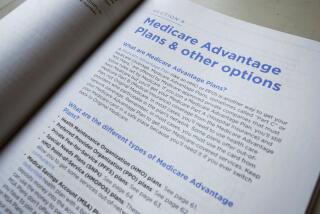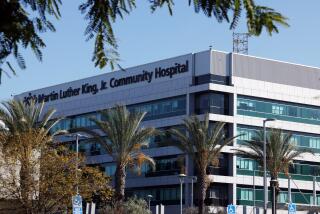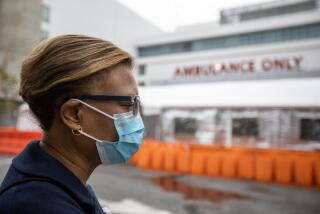How to avoid a return to the hospital
The only thing less pleasant than a stay in the hospital is having to go right back there to deal with complications. And experts say it happens all too often.
One in 8 elderly patients is readmitted to the hospital within 30 days of being discharged after surgery, according to a recent study by the Robert Wood Johnson Foundation.
But efforts are underway to bring down the number of readmissions. The federal government, for instance, can fine hospitals with too many patients readmitted within 30 days after being treated for heart attacks, heart failure or pneumonia. And more medical centers are upgrading their procedures and putting in place new programs to help patients avoid return visits.
That’s been a good thing for Marjorie Crear. The 66-year-old Los Angeles resident was admitted to Ronald Reagan UCLA Medical Center twice last year — once in June after a heart attack and again in September after a stroke.
After her last hospital stay, Crear, who suffers complications from hypertension and diabetes, was assigned a care coordinator on staff at UCLA who makes sure she takes her medications, keeps her medical appointments and follows her doctors’ orders.
Without that help, she said, “I don’t know what I would do.”
Not everyone gets that kind of assistance. But experts say patients and their families can play a big role in preventing readmissions. By recognizing common pitfalls, putting supports in place and knowing where to turn for help, families often can help keep a loved one from needing return trips to the hospital.
Here are some suggestions on what to do.
•Be clear about medications. After her stroke, Crear found it difficult to keep track of her medications and remember when to take them. “Once I came home, I needed help,” she said.
Difficulty managing medication is a common problem, experts say, and is one of the main reasons for hospital readmissions. A recent study by Yale University researchers found that 81% of patients discharged from the hospital experienced medication errors, in many cases because they didn’t understand changes made to their prescriptions.
“It’s important to make sure, if there have been any changes to the medication regimen in the hospital, that it’s written down and understood,” said Dr. Sam Skootsky, chief medical officer for the UCLA Faculty Practice Group and Medical Group. “Sometimes dosage is changed or a drug is discontinued or added.”
•Establish a plan for follow-up. According to the Johnson foundation report, less than half of patients visit their doctors within two weeks of leaving the hospital.
“That’s a big reason why patients are readmitted. They don’t follow their doctors’ orders,” said John DeHart, chief executive of Vancouver, Canada-based Nurse Next Door, which provides in-home care throughout the U.S.
It’s not so surprising, given that patients are often in a fog of medication and in pain when leaving the hospital. If possible, have a friend or family member there to listen to discharge instructions.
•Don’t forget the basics. “Some of the things that prevent readmissions are medical, but many are not,” Skootsky said.
Crear, who resides in the Chesterfield Square neighborhood of South Los Angeles, lives alone. She is no longer able to shop or cook for herself. The UCLA program is helping to make sure she has access to nutritious meals and transportation to her doctor appointments, among other things.
If a care coordinator like Crear’s isn’t available, ask around. Kathleen Kelly, executive director of the National Center on Caregiving in San Francisco, suggests that families put together a support network. Websites such as CarePages (www.carepages.com), Caring Bridge (www.caringbridge.org) and Lotsahelpinghands (www.lotsahelpinghands.com) enable caregivers to create an online community connecting friends and family members who are interested in pitching in to help.
“Lots of families have found them to be quite useful,” she said.
Franchise services such as Nurse Next Door typically offer private in-home care for both medical and nonmedical needs, such as help bathing, cooking and running errands. The cost for this type of care, according to DeHart, is roughly $25 per hour.
•Know your resources. It’s common for people — especially the elderly — to need short-term help at home after leaving the hospital. Often, in-home services aren’t covered by insurance.
If you’re low-income, it’s worth checking to see if you qualify for Medi-Cal, California’s Medicaid program for people with limited income. “If you’re medically eligible and meet criteria, you may be able to hire in-home help,” Kelly said.
Here are some other resources:
Benefitscheckup.org, an online service of the National Council on Aging, can help older adults determine their eligibility for federal, state, local and private benefit programs.
National Center on Caregiving’s Family Care Navigator is a good place to learn about available healthcare benefits.
And sites such as Caring.com can help connect people with in-home caregivers.
With help from UCLA, Crear feels she stands a much better chance of avoiding another hospital stay. A major difference is that now, her post-hospital care is well organized, she said. “At least there’s a sense there is some hope. It makes it so I’m not so stressed out.”
Zamosky writes about healthcare and health insurance.






